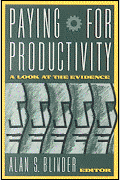Will higher pay provide an incentive for better work? Can productivity be increased by changing the way workers are compensated? In response to the urgent need to improve productivity performance in American industry, leading economists examine alternative compensation schemes to assess their efficiency in raising productivity.
Over the years a number of suggestions have been made for improving labor productivity by changing the manner in which laborers are compensated for their efforts. The ideas presented and analyzed in this volume have all been put into practice, in modified form or on a small scale, in the United States or elsewhere. Some are new; others quite old.
David I. Levine and Laura D’Andrea Tyson consider the effects of employee participation in decisionmaking on firm performance, and Martin L. Weitzman and Douglas L. Kruse discuss the implications of profit sharing and related forms of pay for group performance. Michael A. Conte and Jan Svejnar analyze employee stock ownership plans in the United States and other forms of worker ownership in Europe; Masanore Hashimoto uses a transaction-cost perspective to assess Japanese employment and wage systems. Daniel J. B. Mitchell, David Lewin, and Edward E. Lawler III give an overall analysis of traditional and alternative pay systems, their history, development, and curent use, and recommend further experimentation with alternative compensation plans to ensure more adaptability on the part of U.S. firms. Blinder provides an overview of the findings and conclusions.
Author
Edited by
Alan S. Blinder is the Gordon S. Rentschler Memorial Professor of Economics and codirector of the Center for Economic Policy Studies at Princeton University. He is also a partner in Promontory Financial Group and vice chairman of the G7 Group. He served as vice chairman of the Board of Governors of the Federal Reserve System from June 1994 until January 1996 and as a member of President Clinton's original Council of Economic Advisers from January 1993 until June 1994.

